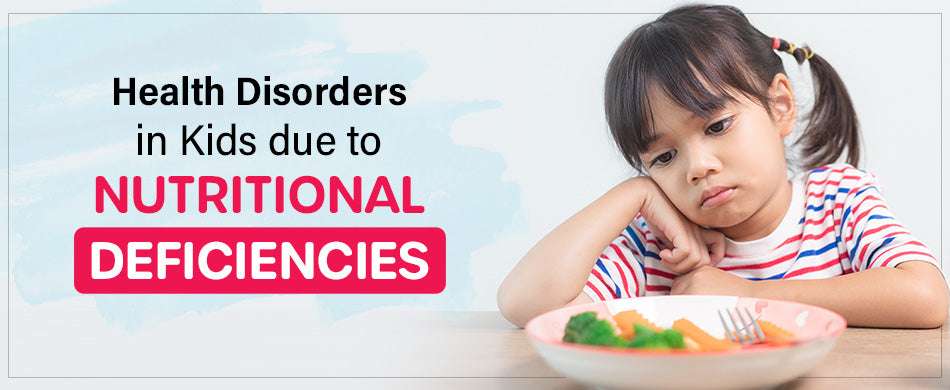
Health Disorders Caused Due To Nutritional Deficiency In Kids
- by Baby Organo
- 1 min 40 sec
Table of Contents
Food is everything we feed to our kids to make them healthy and human with maximum potential. It is said that 0-5 years of age is a 'golden period' for parents to provide the best nutrients to their kids to gain their utmost benefits. Generally, parents are aware of the importance of nutrient intake for kids, yet there are many cases where nutrition deficiencies in pediatric age groups are found.
Most people believe that nutrient deficiencies in children are only detected in underprivileged kids, which isn’t wholly accurate. And we as parents must get off this notion because nutrition deficiency in early life is a global concern.
A child’s dietary intake and eating patterns, lack of vitamins and minerals, and irregular routine significantly fuel nutritional deficiencies. Nutrient adequacy can lead to many health problems in kids, including malnutrition, digestion issues, skin problems, poor bone development, stunted growth, and more.
Here’s a list of diseases caused by nutrient deficiencies in children
Diseases Caused By Nutrient Deficiencies in Kids
Stunting
Malnutrition or lack of nutrition is the primary reason for stunting in kids. A child’s height remains too short for their age, known as stunting. It affects a child’s both cognitive and physical development.
Moreover, a stunted child is prone to becoming overweight as an adult and may also have more health risks. A child can also be stunted because of a malnourished mother. Apart from the transgenerational cycle, stunting causes impaired brain development, lower IQ, and lower cognitive potential in kids.
Vitamin Deficiencies
Vitamin B1 - Causes thiamine deficiency known as beriberi. It causes lethargy, mental depression, and decreased appetite.
Vitamin B2 - Lack of protein and energy results in Riboflavin deficiency, also known as B12 deficiency. It causes redness of the mouth, dermatitis, stomatitis, sore throat, glossitis, etc.
Vitamin B12 - Lack of vitamin B12 can lead to migraine, mouth sores, white spots on the skin, shortness of breath, and others.
Vitamin A - With vitamin A deficiency, children are susceptible to infections, night blindness, damaged hair, dry skin, and difficulty in the wound healing process.
Vitamin C - The signs of vitamin C deficiency include bruising and gingival bleeding, poor immunity, vague muscle, joint pains, small brown spots on the skin, and thickening of the gums.
Vitamin D - The low vitamin D symptoms include lethargy, irritability, and muscle and bone pain. Severe symptoms of low vitamin D can also cause rickets in children.
Anemia
Anemia is caused due to the lack of iron in a child’s diet. It is known as anemia when the number of red blood cells is low or when there’s lower hemoglobin in the red blood cells.
Iodine Deficiency
Iodine deficiency in kids may hinder their bodily function and growth. Iodine is a mineral found in soil and seawater. And, lack of iodine in children’s regular diet may cause issues with the thyroid hormone in a thyroid gland. Lack of iodine for children and unborn babies may lead to low IQ, intellectual disability, stunted growth, and brain damage.
Kwashiorkor
Kwashiorkor is a severe case of malnutrition in kids. A rare type of malnutrition occurs due to a lack of proteins. Symptoms of kwashiorkor include weight loss, generalized swelling, weakened immune system, enlargement of the abdomen and liver, and slowed growth.
Providing a well-balanced diet to your child is all it takes to keep them away from nutritional deficiencies. There are many challenges for parents to deal with picky eaters or if their child is food allergic or has gastrointestinal issues.
However, as parents, we are responsible for providing an ideal meal for our child that combines various groups of foods, including grains, veggies, dairy, proteins, and fruits. It isn’t possible to make your toddler eat everything in one meal. Therefore, you can divide the meals for the entire day.
Consider keeping the food intake activity exciting and having fun meal time to make it enticing for your kiddo. Lastly, do not forget to eat healthy, because a child will only follow what he sees.
- Tags:
- Parenting tips

